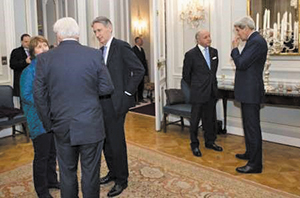
i24 with AFP–Iran and world powers have agreed to extend the deadline for reaching agreement on Tehran’s nuclear program to July 1, 2015. Having failed to meet their Nov. 24 deadline, the sides agreed Monday in Vienna to reconvene in December and resume their negotiations.
The negotiations are likely to be extended to July 1 next year, Western diplomats said. In the meantime, Iran will get $700 million of its frozen assets each month.
Israeli Prime Minister Benjamin Netanyahu on Monday welcomed the decision to postpone a deal with Iran and to keep talking.
“No deal is better than a bad deal. The deal that Iran was pushing for was terrible,” he told the BBC. “The deal would have left Iran with the ability to enrich uranium for an atom bomb while removing the sanctions. The right deal that is needed is to dismantle Iran’s capacity to make atomic bombs and only then dismantle the sanctions. Since that’s not in the offing, this result is better, a lot better.”
“I hope that the pressures continue. I mean, the fact that there’s no deal now gives an opportunity to continue the economic pressures.
“We must continue and intensify sanctions them. Of course Israel is closely monitoring events and Israel always reserves the right to defend itself.”
World powers and Iran meanwhile were likely to extend their deadline of midnight Monday to agree a nuclear deal and will meet again in December, a Western official said.
“Given progress made this weekend, talks headed to likely extension with experts and negotiating teams reconvening in December at a yet to be determined location,” the diplomat said in Vienna. The comment came as the sides held their first joints talks since the meetings began nearly a week ago. “Some progress has been made, but we need to discuss some issues with our capitals. We will meet again before the new year. This is an ongoing process.”
Extension of talks
The five permanent members of the UN Security Council and Germany (the P5+1) have been locked in talks with Iran for months, seeking to turn an interim deal that expires at midnight (2300 GMT) on Monday into a lasting accord.
Such an agreement, after a 12-year standoff, is aimed at easing fears that Tehran will develop nuclear weapons under the guise of its civilian activities, an ambition it hotly denies.
As a result, late Sunday a senior US State Department official said the powers and Iran were now discussing putting more time on the clock.
The official said it was “only natural that just over 24 hours from the deadline we are discussing a range of options… An extension is one of those options.” This came after US Secretary of State John Kerry met his Iranian counterpart Mohammad Javad Zarif for the sixth time since Thursday in an attempt to break the deadlock.
British Foreign Secretary Philip Hammond said however that the parties would still make a “big push tomorrow (Monday) morning to try and get this across the line.”
“Of course if we’re not able to do it, we’ll then look at where we go from there,” he said. “We’re still quite a long way apart and there are some very tough and complex issues to deal with.”
Chinese Foreign Minister Wang Yi was expected in the Austrian capital early Monday, completing the line-up of all the six powers’ foreign ministers.This included Russian Foreign Minister Sergei Lavrov, a key player in the talks. Earlier in the week he said all the elements were in place for a deal with just “political will” missing.
Sides remain far apart
Diplomats on both sides say that despite some progress, the two sides remain far apart on the two crucial points of contention: Uranium enrichment and sanctions relief.
Enriching uranium renders it suitable for peaceful purposes like nuclear power but also, at high purities, for the fissile core of a nuclear weapon.
Tehran wants to massively ramp up the number of enrichment centrifuges – in order, it says, to make fuel for future reactors – while the West wants them dramatically reduced.
Iran wants painful UN and Western sanctions that have strangled its vital oil exports lifted, but the powers want to stagger any relief over a long period of time to ensure Iranian compliance with any deal.
“What a deal would do is take a big piece of business off the table and perhaps begin a long process in which the relationship not just between Iran and us but the relationship between Iran and the world, and the region, begins to change,” US President Barack Obama in an ABC News interview aired Sunday.
In view of the difficulties – and of the dangers posed by the alternative of a complete collapse – many experts have long believed that the negotiators would put more time on the clock.
An Iranian source told AFP earlier Sunday, while stressing at that point that adding time was not yet on the table, that the extension “could be for a period of six months or a year.”










